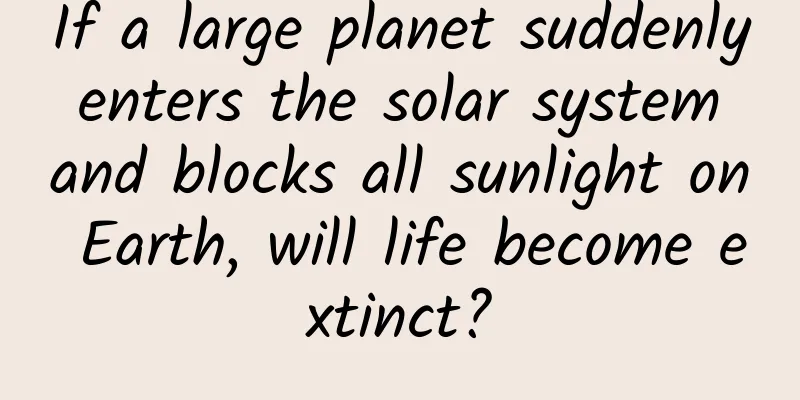If a large planet suddenly enters the solar system and blocks all sunlight on Earth, will life become extinct?

|
This article is based on answering a question from a netizen: "Suppose the Earth is blocked by a large planet that has entered the solar system (pure imagination), how can life on Earth survive?" This is really just a pure imagination question, because such a thing is impossible. But since it is pure imagination, we might as well reason it according to scientific logic. For a planet to block all the light from the sun to the earth, it must be sandwiched between the sun and the earth's orbit, and it must match the relationship between the earth's orbital speed and the sun, and always block the sun and the earth. Therefore, the planet must be large enough and coincidental enough. If such a strange thing really happens, the impact caused by blocking sunlight alone is roughly as follows: Without the energy of solar radiation, all life will wither and die, and eventually disappear from the earth. But this disappearance is gradual. First, plants that rely on photosynthesis to grow will wither and die, which will lead to the loss of the foundation of the food chain. Just like building a house, if the foundation is gone, the superstructure will collapse. From the perspective of the food chain, without plants, the first to be threatened are herbivores, including microorganisms. Without a food source, they will soon become extinct; then carnivores or omnivores that rely on herbivores for food will also starve to death and become extinct. Some people may think that human science and technology have developed to the point where, even without the energy of sunlight, we can continue to engage in planting and breeding underground or with artificial sunlight (light) to meet the survival needs of humans and some animals. But this is just an ideal, which may be able to keep a very small number of people alive, but before that, it is a process of continuous destruction of billions of humans. Because, in addition to eating, drinking, defecating and urinating, people also need to keep warm and deal with plagues and diseases. Without sunlight, social resources cannot guarantee the survival needs of billions of people. Moreover, without solar radiation, the Earth will soon cool down, with global temperatures dropping to dozens of degrees below zero or even one or two hundred degrees below zero. In this extreme cold, everything will freeze. Only if an ecological cycle can be formed underground can people have hope of survival. But if this cold and darkness lasts forever, hope will become increasingly slim. Perhaps with the change of living methods, humans will create an underground civilization. But even if a large-scale underground city is built, it is unlikely that the earth can support the current population of more than 8 billion. I think it would be very good if it can barely retain 100 million people. In this way, 90% of the population will be sacrificed in a few years. Think about this scenario, what a terrible disaster it will be. But the problem is that the real consequences are far more terrifying than this simple imagination. Because if a planet that can block all the sunlight on Earth can really come near the Earth, it will not only bring darkness and cold to the Earth. This planet must be very large to block all the sunlight on Earth. The huge gravity of the planet will disrupt the gravitational balance of the entire solar system. This disaster will come before the sunlight is blocked. As for how big a planet needs to be to block all the sunlight from the Earth, it depends on how far away the planet is from the Earth. Generally speaking, to block all the sunlight from the Sun to the Earth, the farther away from the Earth, the larger the circular area required, the larger the size and mass of the planet, and the greater its gravity. Let's take the moon as an example. When the moon blocks the sun to form a total solar eclipse, the moon's umbra will form a shadow area with a diameter of about 250 kilometers on the earth. The diameter of the moon is 3,476 kilometers, and the diameter of the shadow area formed on the earth by blocking the sunlight is about one-fourteenth of the diameter of its main body. Therefore, if this planet that blocks all the sunlight from the Earth is close to the Earth, it needs to be about the same size as the Earth, or a little larger. If it is as far away as the Moon, this planet needs to be about 14 times the diameter of the Moon, that is, a planet with a diameter of about 48,600 kilometers, which is about the same as Neptune; if it is farther away, it needs a planet as big as Jupiter. If you want to block all the sunlight from the Earth at the position of Venus, which is about 108 million kilometers (0.725 AU) from the Sun, about one-third of the straight-line distance from the Earth to the Sun, you need a planet about 0.3 times the diameter of the Sun. The diameter of the Sun is 1.392 million kilometers, and the diameter of Jupiter is about one-tenth of the diameter of the Sun. 0.3 times the diameter of the Sun is equivalent to the diameter of three Jupiters superimposed. What will happen then? The entire sun is blocked, the earth is dark, and cold will soon come. But the problem is that people can't wait for the various consequences caused by blocking solar radiation, and the disaster will come earlier. Now let's take a planet as big as Jupiter as an example to see what will happen when it comes near the earth. Jupiter's mass is about 318 times that of the Earth, its diameter is about 11 times that of the Earth, and its volume is 1321 times that of the Earth. When Jupiter is only as far away from us as the Moon, its gravitational tidal force will produce a huge tearing force on the Earth, and will soon tidally lock the Earth, that is, only one side of the Earth will always face Jupiter. The powerful tidal gravity will pull the earth's sea water to a height of one to two thousand meters, the hard rock crust will also be deformed, all volcanoes will be awakened and erupt one after another, super-strong earthquakes will occur one after another across the globe, the entire surface of the earth will be filled with tsunamis, magma will flow, volcanic ash will rise straight up, quickly cover the entire globe, all buildings in the world will soon be destroyed, the rupture of the earth's crust will allow the internal high temperature to overflow in large quantities, and the global temperature will rise rapidly in a short period of time. At this time, the entire earth will be completely plunged into a hellish and horrific scene, and life will quickly disappear in this purgatory. Even if there are still a few humans or lives struggling, they will face a terrible consequence, that is, the Earth's atmosphere will be sucked away and escape under the huge gravity of Jupiter, and the Earth will become a vacuum or a world with extremely thin atmosphere, and all creatures that rely on oxygen to survive will be suffocated. At this time, anaerobic organisms may become active, but the high temperature will kill them. The extremely close distance between Jupiter and Earth will completely change the Earth's normal trajectory. Earth will no longer be able to orbit the Sun and will be forced to become a satellite of Jupiter, orbiting around Jupiter. If the orbital speed does not increase, Earth will be slowly pulled into Jupiter's embrace. When the distance reaches Jupiter's Roche limit, which is about 56,000 kilometers to 109,300 kilometers, Earth will be torn apart by Jupiter's powerful tidal force, and the debris will eventually fall into Jupiter's dense atmosphere and be swallowed up without a trace. If the planet is farther away from the Earth, it will need a larger volume to completely block the Sun, and its mass will increase accordingly. The gravitational disturbance on the Earth and even the Sun will be greater, and the consequences will be more complicated and serious. But no matter what the situation is, the Earth will not have a good outcome. It is not just as simple as blocking the Sun's rays, nor is it just a question of whether life can survive, but whether the Earth itself will be destroyed. In fact, disasters can occur even earlier. Because if a huge planet really breaks into the solar system, the above consequences will not occur until it comes near the earth. Instead, from the moment it breaks in, the existing movement order of the entire solar system will be disrupted. You know, the gravitational radius of the solar system is more than one light year. If a huge planet really enters the gravitational range of the solar system and flies towards the earth and the sun, the process is also very long. Even if this planet flies from the edge of the solar system to the vicinity of the earth at a speed of 100 kilometers per second, it will take 3,000 years to fly. During these 3,000 years, the gravity of this planet will increasingly affect the orbits of other planets in the solar system, and of course will gradually affect the orbit of the earth. However, if the speed of a planet reaches 100 kilometers per second, it will far exceed the third cosmic speed (16.7 kilometers per second), which is the escape velocity of the solar system. In this case, the gravity of the sun cannot hold the planet, and it will only become a passer-by in the solar system. Just like the extrasolar asteroid Oumuamua that passed near the earth in 2017, it circled the sun once and flew out of the solar system without looking back. Oumuamua is very small, just a cigar-shaped asteroid about 400 meters long and 40 meters wide. When it passed by the Earth, it was at a speed of 26.3 kilometers per second, which is much faster than the third cosmic speed, and the sun's gravity cannot catch it. However, Oumuamua's weak gravity will not cause observable effects on the planets in the solar system. If a planet that can block the sun's sunlight breaks in, it will be another matter. If there is such a huge planet flying towards the earth at high speed, its gravitational disturbance to the earth will become greater and greater, and the impact process is very complicated. The current level of human technology is simply not capable of dealing with such a disaster. One thing is certain: such a huge planet is flying towards the earth at high speed, and humans will be extinct before it reaches a position where it can block the sunlight on the earth, and there is no chance to see such a wonderful sight. What do you think about this? Welcome to discuss. This is an original article from Space-Time Communication. Please respect the author’s copyright. Thank you for reading. |
<<: Using special chocolate as material! He spent 9 years making edible 3D printing
>>: Beware! These eating habits may ruin your thyroid gland!
Recommend
On the rise of Chinese companies' overseas acquisitions: a blessing or a curse?
UBS analyzed the current rise of Chinese multinat...
K12 online education activity operation sop!
Breaking down the basic meaning of referral and t...
The laser TV market is in a saddle-shaped decline, and how to break the situation has become an urgent matter
After years of rapid growth, it was thought that ...
Is the Turing test still relevant today?
Source: Dark Matter Articles/medium *This article...
6 truths about Taobao short videos!
Double Eleven is coming soon, and Taobao is makin...
Will I get pneumonia if I keep coughing after having a positive test? How to relieve cough? 10 questions about cough
Source: People's Daily The cover image of thi...
To ignite Spring Festival traffic, Tencent Advertising’s super guide for Spring Festival placement is a must-read!
The peak traffic volume of the year - the countdo...
Intel's big change in mobile chips: Ignore the immediate and only care about poetry and distant places?
There are rumors in the industry that Intel will ...
Why does Microsoft prefer mobile keyboard apps recently?
[[163288]] Recently, Microsoft quietly launched a...
Your Guide to YouTube Video Ad Formats for 2020!
Video marketing and brand promotion through YouTu...
How to design a suitable TV game?
I first entered the TV game industry half a year ...
YouTube Chief Engineer: VR is the key to YouTube's future
After Matthew Mengerink became a new engineer at ...
What are the characteristics and trends of advertising for tool apps?
Mobile tool apps are a type of app that started r...
Do we really need three meals a day?
The idea of "three meals a day" is ve...
Ling'er Investment Research Diary: Golden Pit Strategy, Buy Low and Win the Golden Pit
Ling'er Investment Research Diary Gold Pit St...









